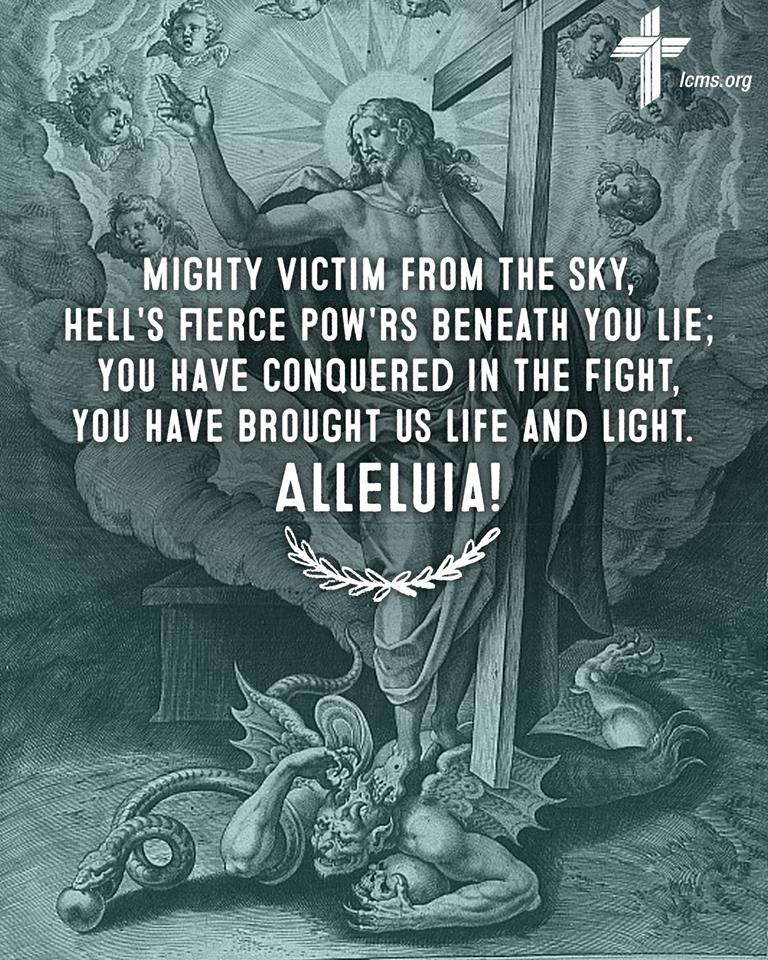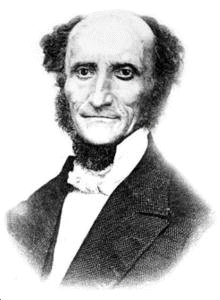Grace, mercy, and peace to you from God our Father, and from our Lord and Savior, Jesus Christ, amen. The text for the sermon is the Second Reading from Acts, which was read earlier.
We all know who makes up the Trinity – God the Father, God the Son, and God the Holy Spirit. We ascribe to God the Father the act of creation. To God the Son, we ascribe the act of redemption. Finally, to God the Holy Spirit, we ascribe the act of sanctification, that is, making us holy. Not only that, the Holy Spirit gives to us the great gift of faith, that without it, nothing that Jesus does works for us. But with all that the Trinity does, the Holy Spirit tends to get the raw end of things, almost forgotten by some. However, the work of the Holy Spirit is just as important as that of the Father or the Son.
As we look at the readings appointed for the Day of Pentecost, all have the Spirit at work in the life of God’s people. Looking at the account of Moses and the elders, God sends forth His Spirit to the seventy elders, “and as soon as the Spirit rested on them, they prophesied.” In response to Moses’ prayer, the Lord addressed the needs of Moses first and provided help in the form of seventy elders. Their responsibility would be to help Moses in the administration of the Israelite nation. On them, the Lord would put His Spirit. As promised, the Spirit was put upon the elders, an extension of the work of the Spirit among God’s people. When the men received the Spirit, they began to prophesy, to proclaim the Word of the Lord.
For some unknown reason, Eldad and Medad, two of the men selected, had not presented themselves at the Tabernacle. They, however, began prophesying in the camp. Some, including Joshua, felt that these two men should be stopped from proclaiming God’s Word. Moses sees no harm in their prophesying and proclaiming of the Word of the Lord. In fact, he responds by saying, “Would that all the LORD’s people were prophets, that the LORD would put his Spirit on them!”
Turning to the gift of the Holy Spirit on the Day of Pentecost, we see “they were all together in one place.” Who is “they” that Luke speaks of? Is it just the 11 apostles of Jesus or would this include more? Likely, this would include the 11 but also the brothers that Peter addressed, numbering 120, since Jesus’ apostles had already received the Holy Spirit. Luke records for us that “they were all filled with the Holy Spirit….”
What is so important regarding the coming of the Holy Spirit? It has been said that “from that moment the Holy Spirit became the dominant reality in the life of the early Church.” Jesus prepared His disciples for the coming of the Spirit with the promise of Pentecost. He promised that His followers would be “baptized in the Holy Spirit.” But Acts emphasizes especially one aspect of the Spirit’s work, namely, inspiring believers to speak God’s message. Every reference to the coming of the Spirit and the work He is sent to do connects Him to the Word of Christ.
The Spirit works through God’s saving Word. It is a Word intended for all people, not just a select and gifted few. Every person in the house was filled with the Holy Spirit. The list of nations represented in Jerusalem signifies that the gift of God’s Word is to all nations and all peoples. It was a message that was understood in every language.
That is the purpose of the Word. It is the message of the saving work of Jesus Christ for all peoples. The day of Pentecost was the giving of that message to the ends of the earth. The Holy Spirit came to spread the Word of God to the apostles, allowing them to spread that Word as pastors to the churches around them: Paul was sent to Corinth, Galatia, Ephesus, Philippi, Colossae, Thessalonica. Timothy was sent to the church at Ephesus to preach and teach. These were faithful pastors who received the gift of the Holy Spirit, though not necessarily on the day of Pentecost.
The miracle of Pentecost is when the Word suddenly reaches us. When we speak of the miracle of the Holy Spirit, we are confessing that something has come to us which we didn’t comprehend before. God gives us His Spirit so that we may have fellowship with Him and be led to do His will, that is, to be children of God.
So what do we have today from the day of Pentecost? We have the Word of God – we have the Gospel of our Lord Jesus Christ, the Good News that He has died to take away our sins. We don’t have any living apostles, but we do have their apostolic teachings in the New Testament. It was this same message that St. Peter proclaimed to the crowds that day; the same message that saved 3,000 that day is the one that is proclaimed here at Trinity and throughout Christendom today.
That same Holy Spirit rests even on us very ordinary people. While we are not all apostles or pastors, we are disciples of Jesus, that is, His followers. The Holy Spirit was given to us at our Baptism. It was in that moment that the Holy Spirit worked in us saving faith in our Lord and Savior, Jesus Christ. The Holy Spirit is given to all believers, not on account of what we do, but what was done for us.
There is much that the Holy Spirit gives to us, though we do not recognize it. Through the Holy Spirit, we are given the opportunity to confess the faith of the Christian Church. It is not a testimony of the believer, but of the works of God and all that He does on behalf of His children. The Holy Spirit allows us believers to speak God’s saving Word in ordinary ways that people understand. The Holy Spirit causes God’s Word of salvation to be understood when it is confessed by believers. The message of salvation doesn’t have to be complex. The message of salvation is simple: Jesus Christ came into the world on behalf of your sins. Because of that, all believers will have everlasting life.
The Holy Spirit still works through the Word of God. It has always been that way and it will always be that way. The true sign of the Holy Spirit at work is the proclamation of God’s Word. The Holy Spirit points to Jesus who is the God-Man who saved us from our sin with His suffering and death on the cross and promises us life everlasting with His resurrection. The Holy Spirit works through God’s Word when we hear it with our ears, when we read it with our eyes, when we experience that Word in the water of Holy Baptism, and when we receive it with the true body and blood of Jesus in the Bread and Wine of the Lord’s Supper. The Holy Spirit is at work when we confess our faith before each other and when we confess our faith before those who do not know Jesus.
Today is a joyous day, for today we give thanks for Christ Jesus who sent to us His Holy Spirit. The Holy Spirit was given to each of you as you were baptized into Christ Jesus. The Holy Spirit works faith in you, fights for you, intercedes for you, strengthens you, and carries you home to Christ. No matter what the problems of this world might bring – sickness, disease, persecution, heartache, or any kind of misery – these shall come to pass and you dear child of God who call upon Jesus who died on the cross and rose for you: will be saved. That is why we have joy. That is our comfort. That is what we should joyously proclaim in the streets for all to hear: “Everyone who calls upon the name of the Lord shall be saved.” In Jesus name, amen. Now the peace of God that passes all understanding, keep your hearts and minds through faith in Christ Jesus, amen.


 Grace, mercy, and peace to you from God our Father, and from our Lord and Savior, Jesus Christ, amen. The text for the sermon is the Gospel, which was read earlier.
Grace, mercy, and peace to you from God our Father, and from our Lord and Savior, Jesus Christ, amen. The text for the sermon is the Gospel, which was read earlier.